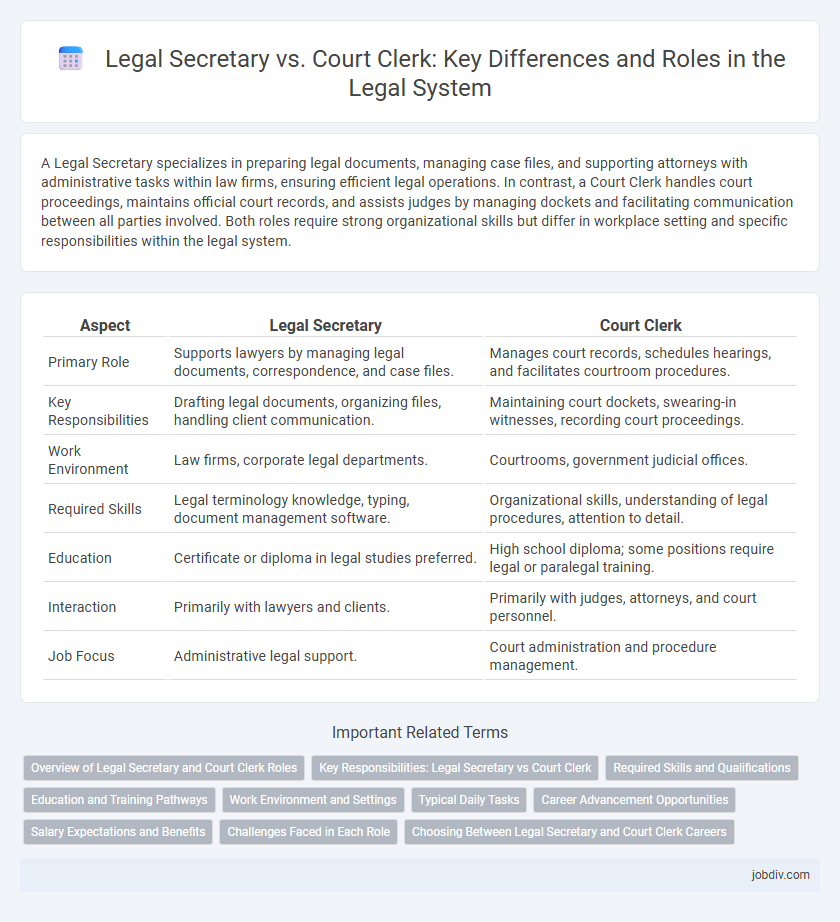A Legal Secretary specializes in preparing legal documents, managing case files, and supporting attorneys with administrative tasks within law firms, ensuring efficient legal operations. In contrast, a Court Clerk handles court proceedings, maintains official court records, and assists judges by managing dockets and facilitating communication between all parties involved. Both roles require strong organizational skills but differ in workplace setting and specific responsibilities within the legal system.
Table of Comparison
| Aspect | Legal Secretary | Court Clerk |
|---|---|---|
| Primary Role | Supports lawyers by managing legal documents, correspondence, and case files. | Manages court records, schedules hearings, and facilitates courtroom procedures. |
| Key Responsibilities | Drafting legal documents, organizing files, handling client communication. | Maintaining court dockets, swearing-in witnesses, recording court proceedings. |
| Work Environment | Law firms, corporate legal departments. | Courtrooms, government judicial offices. |
| Required Skills | Legal terminology knowledge, typing, document management software. | Organizational skills, understanding of legal procedures, attention to detail. |
| Education | Certificate or diploma in legal studies preferred. | High school diploma; some positions require legal or paralegal training. |
| Interaction | Primarily with lawyers and clients. | Primarily with judges, attorneys, and court personnel. |
| Job Focus | Administrative legal support. | Court administration and procedure management. |
Overview of Legal Secretary and Court Clerk Roles
Legal Secretaries provide essential administrative support to lawyers, managing tasks such as drafting legal documents, scheduling appointments, and maintaining case files with a high degree of accuracy and confidentiality. Court Clerks, on the other hand, are responsible for managing court records, preparing dockets, swearing in witnesses, and ensuring smooth courtroom operations. Both roles require strong organizational skills and knowledge of legal terminology, yet Legal Secretaries primarily assist attorneys while Court Clerks serve the judicial system directly.
Key Responsibilities: Legal Secretary vs Court Clerk
Legal secretaries manage administrative tasks such as drafting legal documents, scheduling appointments, and maintaining client files to support attorneys in law firms. Court clerks handle courtroom operations, including maintaining court records, swearing in witnesses, and managing case flow during trials. Both roles require attention to detail and organizational skills, but legal secretaries focus on legal documentation while court clerks ensure procedural compliance within the judicial system.
Required Skills and Qualifications
Legal secretaries require strong knowledge of legal terminology, proficiency in word processing, and excellent organizational skills to manage case files and correspondence efficiently. Court clerks must have a thorough understanding of courtroom procedures, strong attention to detail, and the ability to manage courtroom records and schedule hearings accurately. Both roles demand excellent communication skills, familiarity with legal documents, and the capacity to work under pressure in fast-paced legal environments.
Education and Training Pathways
Legal secretaries typically complete specialized postsecondary certificates or associate degrees in legal studies, emphasizing legal terminology, document preparation, and office technology. Court clerks often require a high school diploma supplemented by on-the-job training or an associate degree in criminal justice or paralegal studies, focusing on courtroom procedures and legal recordkeeping. Both roles benefit from familiarity with legal software, but legal secretaries usually undergo more extensive formal education related to legal documentation and administrative tasks.
Work Environment and Settings
Legal secretaries typically work in law firms, corporate legal departments, or government agencies, supporting attorneys with document preparation and case management in office settings. Court clerks operate within courthouse environments, managing courtroom records, dockets, and administrative functions during trials and hearings. Both roles demand familiarity with legal procedures but differ significantly in daily interactions and physical workspaces.
Typical Daily Tasks
A Legal Secretary typically manages document preparation, correspondence, and scheduling for attorneys, ensuring all legal paperwork is accurate and filed correctly. In contrast, a Court Clerk handles administrative tasks within the courtroom, including maintaining court records, swearing in witnesses, and assisting judges during proceedings. Both roles require strong organizational skills but differ in their interaction with legal professionals and the public.
Career Advancement Opportunities
Legal secretaries benefit from career advancement through specialization in areas like litigation or corporate law, offering pathways to roles such as paralegal or legal assistant. Court clerks gain opportunities by progressing to senior clerical positions or administrative roles within the judicial system, often moving into court administration or case management. Both career paths emphasize developing organizational and legal knowledge skills to enhance upward mobility within legal institutions.
Salary Expectations and Benefits
Legal secretaries typically earn an average salary ranging from $45,000 to $65,000 annually, with benefits often including health insurance, retirement plans, and paid vacation. Court clerks generally have a salary range of $40,000 to $60,000 per year, with similar benefits such as government-subsidized health coverage, pension plans, and paid leave. Variations in compensation depend on geographic location, level of experience, and the specific employer within the legal or judicial system.
Challenges Faced in Each Role
Legal secretaries often face challenges such as managing complex legal documents, ensuring accurate transcription of legal terminology, and coordinating communication between attorneys and clients under tight deadlines. Court clerks encounter difficulties including maintaining courtroom order, accurately recording trial proceedings, and managing case files amidst fluctuating court schedules. Both roles demand exceptional organizational skills and the ability to handle high-pressure situations while adhering to strict legal protocols.
Choosing Between Legal Secretary and Court Clerk Careers
Choosing between careers as a Legal Secretary and a Court Clerk depends on individual skills and interests within the legal field. Legal Secretaries primarily manage document preparation, correspondence, and administrative support for attorneys, requiring strong organizational skills and legal terminology proficiency. Court Clerks handle courtroom administration, case file management, and coordination with judges, necessitating attention to detail and familiarity with court procedures.
Legal Secretary vs Court Clerk Infographic

 jobdiv.com
jobdiv.com